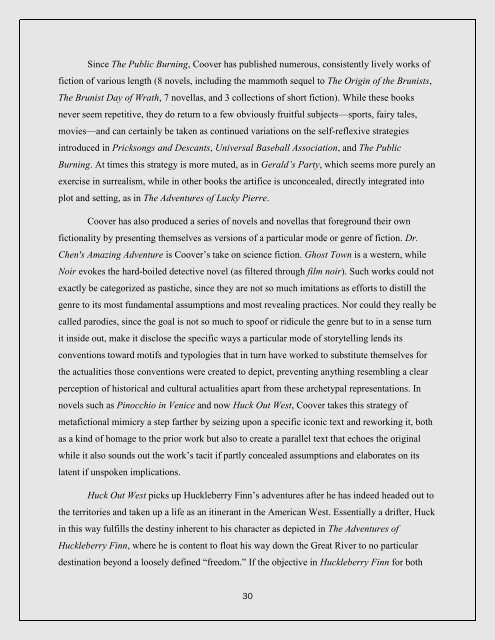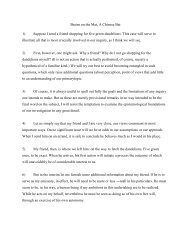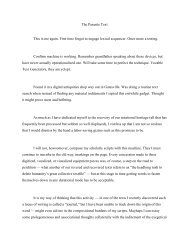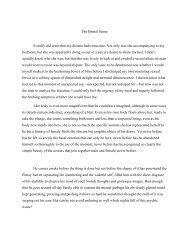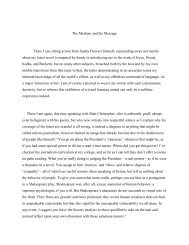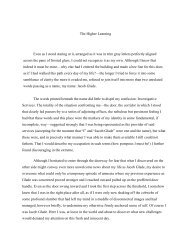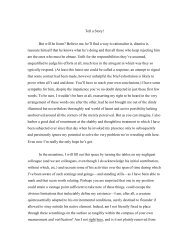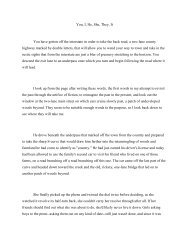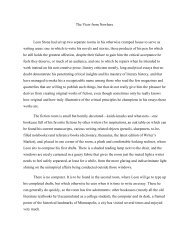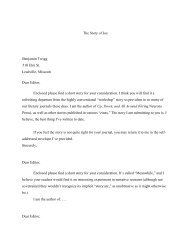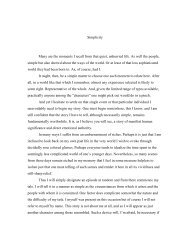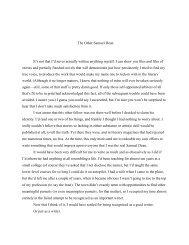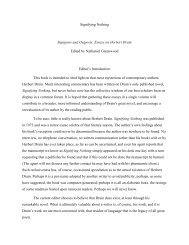APF
You also want an ePaper? Increase the reach of your titles
YUMPU automatically turns print PDFs into web optimized ePapers that Google loves.
Since The Public Burning, Coover has published numerous, consistently lively works of<br />
fiction of various length (8 novels, including the mammoth sequel to The Origin of the Brunists,<br />
The Brunist Day of Wrath, 7 novellas, and 3 collections of short fiction). While these books<br />
never seem repetitive, they do return to a few obviously fruitful subjects—sports, fairy tales,<br />
movies—and can certainly be taken as continued variations on the self-reflexive strategies<br />
introduced in Pricksongs and Descants, Universal Baseball Association, and The Public<br />
Burning. At times this strategy is more muted, as in Gerald’s Party, which seems more purely an<br />
exercise in surrealism, while in other books the artifice is unconcealed, directly integrated into<br />
plot and setting, as in The Adventures of Lucky Pierre.<br />
Coover has also produced a series of novels and novellas that foreground their own<br />
fictionality by presenting themselves as versions of a particular mode or genre of fiction. Dr.<br />
Chen's Amazing Adventure is Coover’s take on science fiction. Ghost Town is a western, while<br />
Noir evokes the hard-boiled detective novel (as filtered through film noir). Such works could not<br />
exactly be categorized as pastiche, since they are not so much imitations as efforts to distill the<br />
genre to its most fundamental assumptions and most revealing practices. Nor could they really be<br />
called parodies, since the goal is not so much to spoof or ridicule the genre but to in a sense turn<br />
it inside out, make it disclose the specific ways a particular mode of storytelling lends its<br />
conventions toward motifs and typologies that in turn have worked to substitute themselves for<br />
the actualities those conventions were created to depict, preventing anything resembling a clear<br />
perception of historical and cultural actualities apart from these archetypal representations. In<br />
novels such as Pinocchio in Venice and now Huck Out West, Coover takes this strategy of<br />
metafictional mimicry a step farther by seizing upon a specific iconic text and reworking it, both<br />
as a kind of homage to the prior work but also to create a parallel text that echoes the original<br />
while it also sounds out the work’s tacit if partly concealed assumptions and elaborates on its<br />
latent if unspoken implications.<br />
Huck Out West picks up Huckleberry Finn’s adventures after he has indeed headed out to<br />
the territories and taken up a life as an itinerant in the American West. Essentially a drifter, Huck<br />
in this way fulfills the destiny inherent to his character as depicted in The Adventures of<br />
Huckleberry Finn, where he is content to float his way down the Great River to no particular<br />
destination beyond a loosely defined “freedom.” If the objective in Huckleberry Finn for both<br />
30


